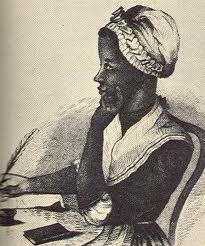 Born in Senegambia, West Africa, in the 1753, Phillis Wheatley was sold into slavery at a young age and transported to North America, becoming one of the first black American literary voices and a prodigious writing talent. At 7 years of age, brought to Boston on a ship called the Phillis, she was purchased by a well to do merchant who wanted a servant for his wife.
Born in Senegambia, West Africa, in the 1753, Phillis Wheatley was sold into slavery at a young age and transported to North America, becoming one of the first black American literary voices and a prodigious writing talent. At 7 years of age, brought to Boston on a ship called the Phillis, she was purchased by a well to do merchant who wanted a servant for his wife.
From the ship that brought her to North America she was called Phillis, while, subject to the custom of the time, she took the surname from her owners, in this case Wheatley. Compared to many of her compatriots at the time, Phillis was lucky to have been taken into a caring family. Though she remained a slave in essence, the Wheatley’s daughter set about teaching the new member of their household how to read and write.
Phillis for her part drank up the education that was often denied both her race and gender. By the time she was 13 she was well versed in the classics of Greece and Rome and it was then, with encouragement from the progressive Wheatley family, that Phillis began to write poetry.

In 1773, it was decided that she would go to London with the Wheatley’s son, Nathaniel, to see if she could publish her poetry there. She found ample support from luminaries such as the Mayor of London and Countess Selina Hastings who let a volume of her poems indeed be published. On her return to North America, Phillis wrote another poem To His Excellency George Washington and, in 1776 was invited to visit him in Massachusetts.
In 1778 she found herself legally freed from slavery and chose to marry another freed slave, John Peters. She had two children but they died in infancy and both she and her husband struggled with poverty for the rest of their lives. Because of her dire finances at the time and the fact that she had now been freed, Phillis produced another work of poetry but could not find the money to publish it.
With a sickly son and her husband in a debtor’s prison, Phillis Wheatley returned back to a life of a servitude, working as a scullery maid. But ill health plagued her and at the age of just 31 she died in 1774. Her son passed away only a few hours later.
Despite her background, Wheatley rarely talked about slavery in her poems. She was plagued by difficulties being accepted throughout her life. In one instance she even had to go to court to prove that she was the author of her own work, simply because colonists at the time did not believe a slave could write it.
Her poem Ode to Neptune is, however, seen as a reflection of her own life. She was not one to merely rehash old conformity but explored the issues that were important to her. Much of what she wrote was a reflection of her life in all its chaos and sense of adventure.

When her book Poems on Various Subjects was published shortly after her death, she was hailed as the most well-known African of the time. Most of the praise, even by the likes of Voltaire, was couched in the racism of the time but, despite that, she remains to this day a leading light in black American literature.

